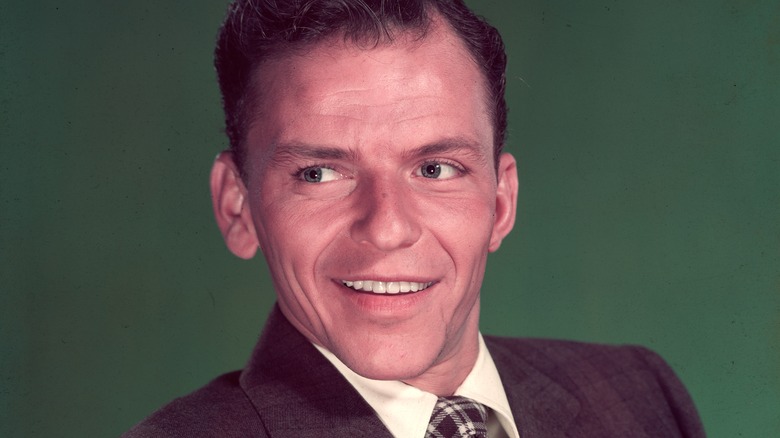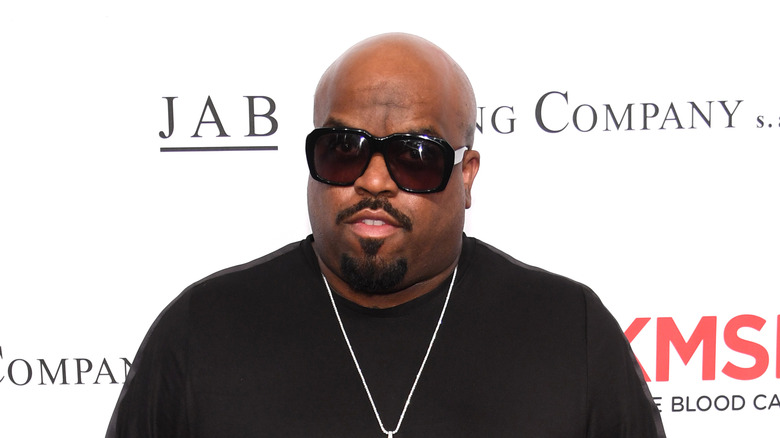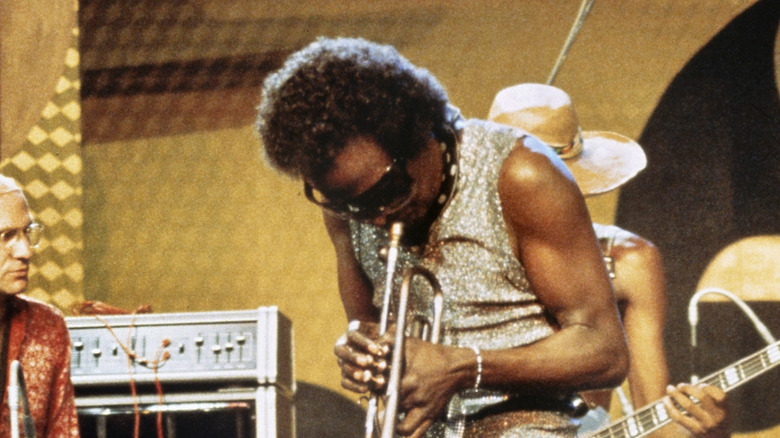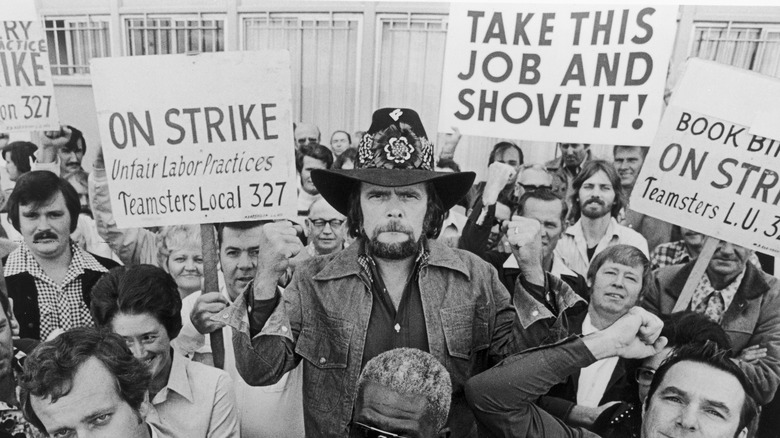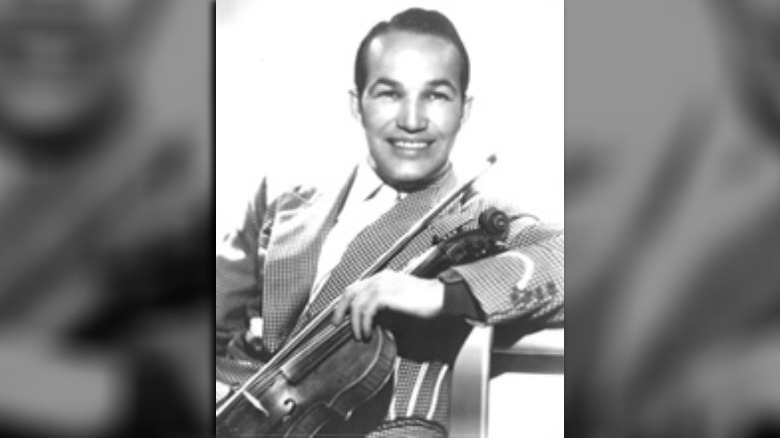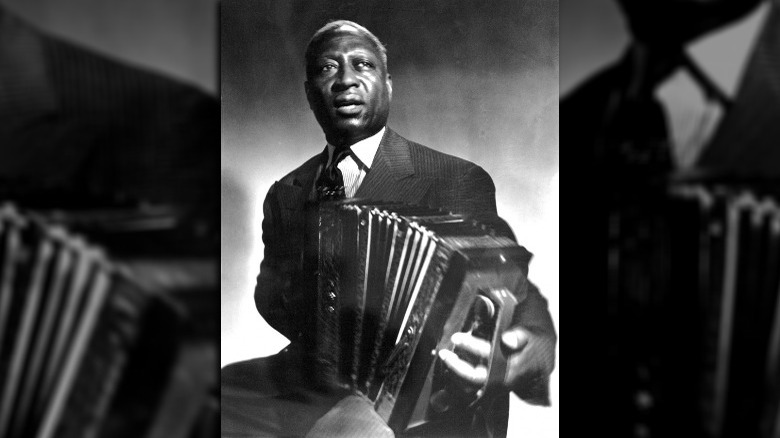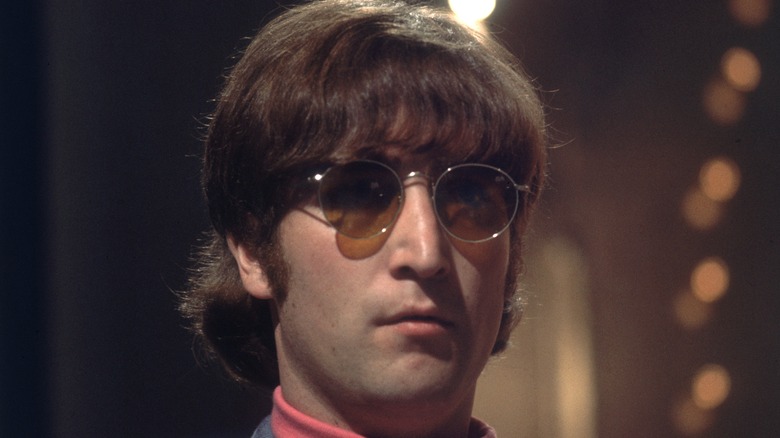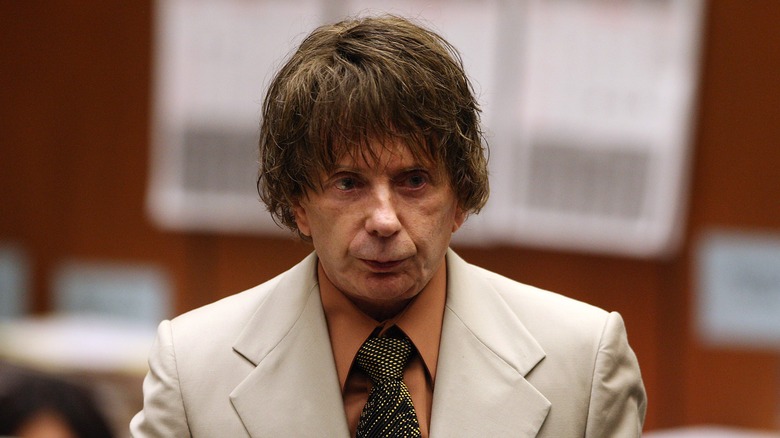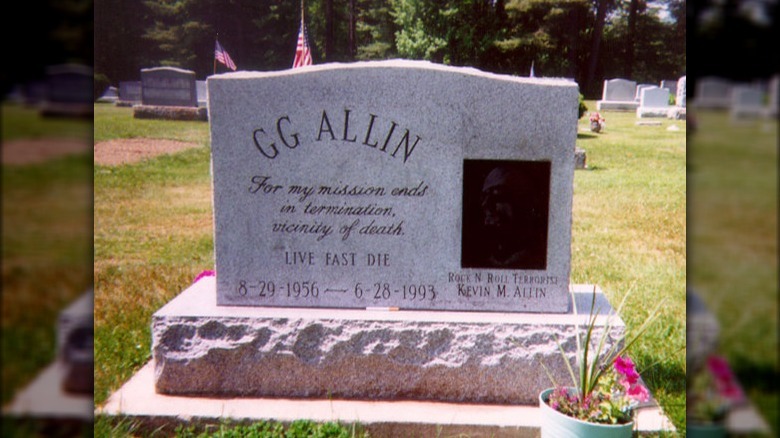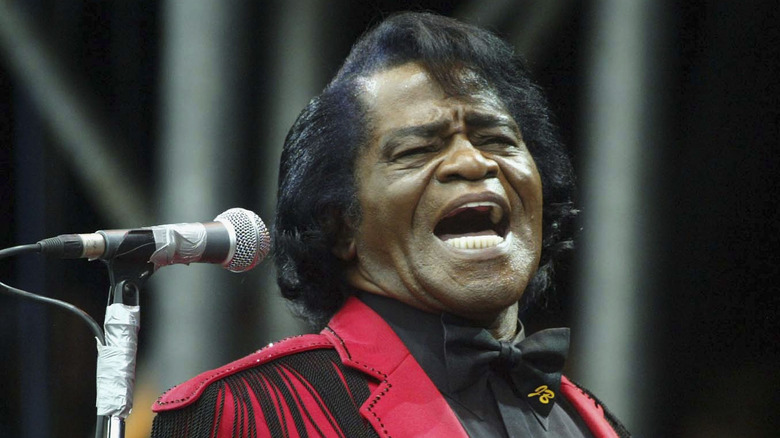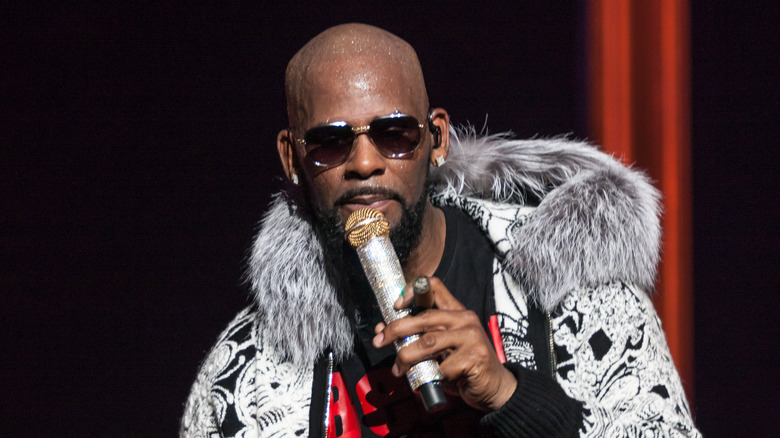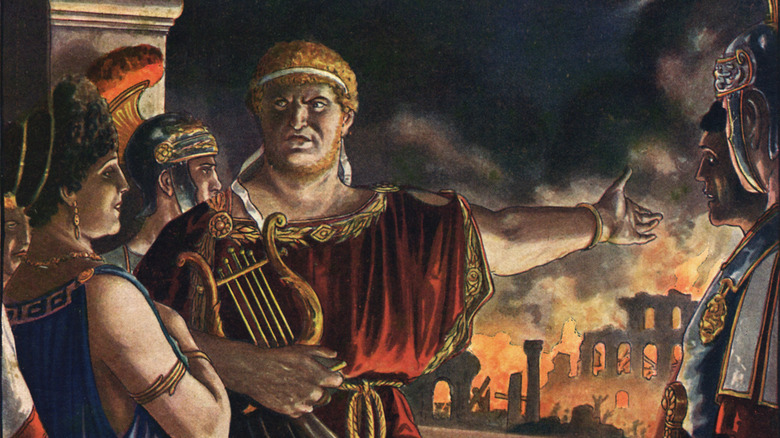Terrible Details About These Respected Musicians
We may receive a commission on purchases made from links.
Some musicians just have a freakish amount of talent. Most of us learn at a young age that we are not those people. The realization probably came as soon as you were old enough to read social cues and you tried showing off your amazing talents to anyone except your pet. (Daisy is a very good dog, but maybe not a very good judge of musical ability.)
Those who do have that freakish amount of talent are the singer-songwriters, the people who can play any instrument they pick up, the ones who get lost in the music of their own making whether they're in the studio or on stage.
There's something almost magical about listening to a true musical genius, and they've definitely earned our respect. But it's easy to forget that behind all that music is a very ordinary person, and sometimes, that ordinary person is a terrible human being.
The following article includes allegations and accounts of domestic abuse, sexual assault, addiction, suicide, and child abuse.
Johnny Cash
There's a lot of dark stuff in Johnny Cash's life, but let's talk about how horrible he was to women. Vivian Cash's book "I Walked the Line" was a heartbreaking tell-all detailing how she continued loving her husband even through the drugs and the affair with his more famous second partner, June Carter Cash. It was Vivian who gave him four daughters, raised them, and stuck with him through the worst of the arrests and the accidental forest fires, but Johnny gave all the credit to June.
Behind closed doors, June Carter didn't actually have it any easier, in spite of the storybook romance performed for the public. Biographer Robert Hilburn (via Esquire) says he was stunned when he found out Cash had cheated on her when she was pregnant with son John Carter. There were many women, but the most painful was probably June's own sister, Anita. John Carter has also talked about his parents' less-than-perfect marriage, and has said (via Reuters) his mother's drug addictions and descent into paranoia came from a near-constant fear Johnny was cheating again. That fear spread to their son, who grew up well aware that his family could fall apart at any time.
Chuck Berry
Chuck Berry was a legend who helped shape rock and roll, and when he died in 2017, The New Yorker described him as "a proud and difficult man" who "was also a genius." He also once punched Keith Richards in the mouth for touching his guitar while they were getting together to organize Berry's 60th birthday party. That's the attitude that got him into all kinds of trouble, and Berry even had a name for those incidents: his "naughties."
It started when, as a teenager, he did three years in a reform school for stealing cars and armed robbery. Fast-forward to 1962, when Berry was 36 years old. He was tossed in the clink for violating the Mann Act, a law that prohibits taking a woman across state lines with "immoral" intentions. Oh, and the girl was 14. He served 20 months of the three years he was originally sentenced to, getting out on appeal after the judge made racist comments.
And the hits just kept on coming, according to the Riverfront Times. In December 1989, Berry was accused of videotaping women in the bathroom of one of his restaurants. The following June, his property was raided, with law enforcement finding weapons, pot, and the videotapes in question, placing him at the center of a class-action lawsuit. Berry's camp eventually settled, but that seriously tarnishes any legacy.
Elvis Presley
It's impossible to describe the effect Elvis Presley had on music history, so let's get right to the dirt. He was 21 when he became ridiculously famous with the success of "Heartbreak Hotel," and after that, all bets were off when it came to how far he was going to go. Along with the fame and fortune came the admiration of countless women, but according to biographer Joel Williamson, there was a particular type of woman Elvis liked: the really, really young ones.
The right age to be an Elvis girl was 14, and when the 22-year-old megastar went on those early tours, he took along a little group of 14-year-olds. Williamson says he was a huge fan of tickling and wrestling, along with everything else short of actual intercourse. Future wife Priscilla was 14 when she met 24-year-old Elvis, and just what went on behind closed doors is debated. What's not debated is that after Lisa Marie was born he lost interest in Priscilla, instead courting another 14-year-old named Reeca Smith.
There was a bit of violence in Elvis, too. Years later, he was engaged to a 21-year-old who claimed he once pulled out a gun and put a bullet in the headboard of the bed she was sleeping in, saying it was "an attention getter." The Guardian says in between those major relationships there were a ton of others, many with underage girls who preferably had tiny, tiny feet.
Frank Sinatra
Frank Sinatra was iconic onstage, but there was a lot of shady stuff that happened offstage. Let's talk about one part of that: his temper. According to The Telegraph, it was so bad that one of his wives once described him as a sort of Jekyll-and-Hyde character, and there's a whole list of physical altercations he was involved in. First, the ones where someone got seriously hurt.
He punched a reporter in 1948, eventually settling the assault and battery charges filed against him. He was staying at the Beverly Hills Hotel when he threw a phone at a random businessman who was also there, and cracked the man's skull. He nearly killed his then-wife Ava Gardner by throwing a champagne bottle at her so hard it cracked the bathroom sink.
Sinatra destroyed an insane amount of stuff, too, usually in fits of rage. He took a knife to a Norman Rockwell painting and shredded it, threw a malfunctioning TV out a window at Sands Hotel in Las Vegas, and smashed a car radio when The Doors' "Light My Fire" came on. Some of the stuff that met an untimely end under his boot was pretty priceless, too, like the Ming vase he destroyed at a Hong Kong hotel after someone missed a lighting cue. That's what happens when you get too used to having things your way.
Jerry Lee Lewis
Talking about the sins and vices of Jerry Lee Lewis is a little difficult, for one simple reason: He had pretty much all of them. He changed the face of rock and roll, he helped shape decades of music, and he also had a ton of shadiness in his past. A lot can be traced back to a nasty temper and a violent streak, but finding it all is tricky. The Guardian interviewed him in 2015 and said it's almost impossible to figure out what's truth and what's legend, including the circumstances around his nickname: the Killer. The story Lewis told is that a friend just ... called him that one day for no discernible reason, but it's also possible it came after he tried to strangle and kill one of his teachers, an act he fully admitted to.
Lewis had seven wives, and two died mysteriously: one by drowning and one by overdose. The latter incident went to court, where Lewis was ultimately cleared of wrongdoing. But the law was not on his side after he shot his bass player in the chest and had to pay out $125,000. Lewis's seventh marriage was to the ex-sister-in-law of his third wife, the most infamous. Myra was 13 years old, and the daughter of Lewis' cousin. Oh and he was still technically married to his second wife at the time. Lewis died in October 2022, at the age of 87.
James Levine
You can't get much bigger than the Metropolitan Opera, and for more than 40 years, conductor James Levine was at the head of it. He sported titles like director emeritus and worked with the company's young artists program as artistic director. The last one is particularly creepy, given that The New York Times announced in March 2018 the Met was officially — and loudly — ending its association with him amid accusations of "sexually abusive and harassing conduct."
Not a lot of details were released, but sometimes, just a few details are enough. The Met's investigation involved interviews with 70 people, and it ended with an official statement saying there was "credible evidence that Mr. Levine engaged in sexually abusive ... conduct toward vulnerable artists in the early stages of their careers." Levine didn't comment on the firing — which came after a December 2017 suspension prompted by four men who came forward to say they had been targeted by the conductor when they were still teenagers. Levine denied the accusations then, but things started looking very, very bad with the revelation it wasn't the first time he'd been accused of that sort of thing. There were rumors of abuse as far back as the 1960s, when Levine was working at the Meadow Brook School of Music.
Cee Lo Green
Cee Lo Green hit something of a rough patch in 2012 and 2013, and it gets a little complicated. According to The Guardian, his troubles only started when he was accused of both giving a woman ecstasy and later raping her. Green ultimately pleaded no contest to the drug felony and got three years of probation along with 45 days of community service. The rape charges simply went away because Green's lawyer argued there was no proof it wasn't consensual.
That's skeevy, and it gets worse. Green took to X, then known as Twitter, to voice his opinions on rape, and saying they're horrible opinions is a huge understatement. He wrote, "People who have really been raped REMEMBER!!!" and "If someone is passed out they're not even WITH you consciously! So WITH Implies consent."
The Twitterverse's meltdown was immediate, and even though he deleted the tweets, other users saved them to prove that once something's on the internet, it's definitely not going away. That's true for everything, and it's especially true when it's a sentiment like that. Green apologized, saying he'd "never condone the harm of any women," but he still became another poster child for proof of just how healthy modern rape culture is (via Mic).
Miles Davis
If there was ever a human being who embodied the spirit of music, that human was Miles Davis and the spirit was jazz. But he was also such a horrible human that when The New York Times reported there was going to be a movie made about his life, they also said it presented some problems.
First, let's mention the fact he used to play with his back to his fans, and God help anyone who was brazen enough to walk up to him. There was the insane vanity, to the point where he condemned music critics for writing pieces that sang the praises of anyone else, claiming they were just out to take away his spotlight. Then there were the heroin and cocaine addictions, stories of pimping, and his abusive relationships with the women he married.
Ex-wife Frances Davis has claimed she wasn't just terrified of him, she ran away a few times convinced he was going to kill her. He admitted to the whole sordid trend of beating his wives in his autobiography, "Miles," and even admitted he approved of other men hitting their wives and girlfriends to keep them in line.
Richard Wagner
Richard Wagner died in 1883, decades before the rise of Hitler and his Nazis. That means he wasn't around to see his music heralded as the soundtrack of the rise of modern antisemitism, but he probably wouldn't have hated the association.
Wagner got more and more vocal about his antisemitic views as he got older. He wrote a ton of jaw-dropping stuff, believing Jews couldn't produce art, only mimic what they'd seen and heard from others. When he struggled as an up-and-coming composer, he blamed Jewish critics for keeping him from success. Later, he did form associations with Jewish philosophers and patrons, but that led into his other bit of shadiness.
Wagner and wife Cosima (who continued his antisemitic crusade after his death) so relentlessly demanded money from the King of Bavaria that The Telegraph says banks started paying them with thousands of coins in hopes of sending a message. It didn't work. Cosima herself was originally a wife of one of the men in Wagner's entourage, and they only married after a long-term affair resulting in a daughter. It's still debatable just how devoted to her he was. He was carrying on with at least one other mistress while he was courting her, so there's that.
Brian Jones
Brian Jones (at right) died when he was 27, and when Rolling Stone reported on the mysterious circumstances of his death, they did it in an article subtitled "Sympathy for the Devil." That's not just a clever play on one of the Stones' songs — Jones made Keith Richards look like the one you'd choose to bring home to meet your parents.
There were, of course, the drugs and the pills that ultimately led to him parting ways with the rest of the band not long before his drowning death. His troubles started long before that, though, and he was kicked out of his grammar school for inciting rebellion. He held down a ton of random jobs, got in the face of the popular press who didn't understand — or particularly like — what the Stones were doing, and behind closed doors he had a violent streak a mile long.
Anita Pallenberg was one of the original muses for the Stones, and she'd eventually go on to have a long-term relationship with Richards. But she started out with Jones, says Rolling Stone, and it was an abusive relationship that ended when Jones hit her so hard he broke his hand on her face. Sympathy for the devil, indeed.
Morrissey
If you want to talk about someone who's been very vocal about some unpopular opinions, Morrissey is your guy.
In 2007, the Independent picked up an interview he did lamenting what he saw as the death of British-ness. While he denied being either xenophobic or racist, he was still quoted as saying things like, "Although I don't have anything against people from other countries ... the price (of immigration) is enormous. Travel to England and you have no idea where you are." (The Manchester-born Morrissey is the son of Irish immigrants, and he later immigrated to Los Angeles and then on to Rome, so ... yeah.) Three years later, The Guardian ran an interview with the vegetarian, who went on record condemning the animals rights abuses going on in China. He then continued, "You can't help but feel that the Chinese are a subspecies."
When the Harvey Weinstein scandal broke, Morrissey (via the Independent) had this to say: "I hate sexual situations that are forced on someone. But in many cases, one looks at the circumstances and thinks that the person who is considered a victim is merely disappointed." He's targeted so many people Rolling Stone did a round-up of his most controversial opinions, and it included blaming Kate Middleton for the suicide of a nurse, shrugging off a massacre that left 77 people dead as "nothing compared to what happens in McDonald's ... every day," and called for Elton John's head to be served to him on a plate.
Peter McNeal
Cake is one of those groups you probably forgot you used to listen to all the time, but before you go back and dig out your CDs, let's talk about what drummer Peter McNeal has been up to. McNeal — who was also the drummer for Norah Jones — made Rolling Stone headlines in 2014 for one of the most despicable reasons you can imagine. The verdict of his court case was in, and he was sentenced to 15 years to life in a California prison and was a permanent addition to the sex offender registry.
It wasn't just because of a single incident, either. The details are way, way too terrible to repeat, so let's just say one incident happened while he was volunteering at a school in Los Angeles. Another one of his victims was only 3 years old at the time, and that's as terrible as it gets.
Johnny Paycheck
Johnny Paycheck — originally named Donald Eugene Lytle — was one of the Grand Ole Opry's most respected members, and an icon who helped build country music. He was known as something of a country music outlaw, too, and his entire career was colored by drug and alcohol misuse. His difficulty staying out of trouble started way before he was a star, though, and when he was still a teenager he enlisted in the U.S. Navy, punched a superior officer, and spent a few years in prison. The record deal came after that, and so did the check forgery and the attempted murder.
That happened on December 19, 1985, says Rolling Stone. Paycheck was on his way home for the holidays when he stopped off at a Hillsboro, Ohio, bar for a drink. He was recognized by a local named Larry Wise, they got to chatting, and ... no one's entirely sure what happened next. Whatever offenses were caused, it ended with Paycheck pulling out a gun and shooting. The bullet grazed Wise's head, and he'd later testify the music legend had "blowed my hat off."
The case dragged on. Paycheck was eventually sentenced to nine years and even tried to revive his career post-prison before he died in 2003.
Steven Tyler
There are two sides to every story, and really, both sides to this one are uncomfortable. When Aerosmith frontman Steven Tyler wrote his 2011 memoir "Does the Noise in My Head Bother You?," he talked a bit about early girlfriend Julia Holcomb (and managed to misspell her name in the book's acknowledgements, notes the Boston Globe). Tyler wrote he had nicknamed her Little Bo Peep, said they liked to get it on in public, and left out a lot of the other details.
Holcomb wanted to clear the air about what she says really happened, so she took to Life Site to tell her side of the story. According to her, she was a 16-year-old from a broken family when she met Tyler and kicked off a relationship with him that really started when her troubled mother signed documents making Tyler her legal guardian. Holcomb says she was already pregnant by the time he asked her to marry him, and plans for a family started to fall apart when his grandmother refused to pass on her ring. Five months into the pregnancy, Holcomb was trapped in a house fire and sent to the hospital, where she says Tyler convinced her to have an abortion. Holcomb left him — he had already moved on to other women — and returned to her parents. Tyler returned to the rock star life.
Michael Brewer
Chetham's School of Music is a prestigious school in Manchester, and until 1994, the director of music there was Michael Brewer. Brewer — who was also the director of the National Youth Choir and was awarded an OBE for his services to music — was handed a jail sentence of six years in 2013. The charge was sexual abuse, and the story gets even darker.
According to the BBC, it started for Frances Andrade when she was 14 years old. Brewer was her teacher, and repeatedly assaulted her between 1978 and 1982. Brewer's then-wife, Hilary, was also involved in the assault and was arrested, charged, and convicted separately. None of this came to light until years later, and when it did, law enforcement stumbled into other complaints that had been covered up, and another affair with a 17-year-old student.
Andrade testified in court, and several of the charges against Brewer and his ex-wife were dropped mid-trial. Only six days after hearing that news, Andrade died by suicide. The Telegraph reported her son blamed not only Brewer, but his defense counsel, too, for taking the route of calling his mother a "liar" and a "fantasist." Even as the judge declared Brewer to be a "predatory sex offender," law enforcement was still tracking down former students and taking more statements about all that had gone on behind the orchestra curtain.
Alexander Scriabin
Alexander Scriabin was a Russian composer who — according to the Julian calendar — was born on Christmas Day. He eventually came to see that as a bit of extra proof that he was the Messiah.
Scriabin was brilliant but troubled, and the Houston Press shares one particular anecdote of just how troubled. His hands were too small for him to play some of the piano pieces he wanted to, so he practiced until they broke, and kept practicing until the bones stretched enough that he could reach the keys. That's the kind of personality we're talking here.
After he got interested in religious philosophy and the occult, he became more and more convinced he was destined to change the world ... and by "change," he meant "bring about the end times." He started writing a massive composition called the "Mysterium," which he envisioned as including music, dance, choreographed perfumes and incenses, and more than a few bells. The goal was to stage the entire, seven-day performance in the Himalayan Mountains, then kick open the door to the end of days and wipe out humanity. His plans were thwarted in the most anti-climactic way possible: He cut himself shaving, it got infected, and he died.
Spade Cooley
Spade Cooley was born in 1910, so you get a pass if you're not incredibly familiar with his name. He was huge in the 1950s, declared he was the "King of Western Swing," led a 30-piece band, hosted his own TV show, and made appearances in more than 50 movies. He's even got a star on Hollywood Boulevard, and you may have had a better chance of remembering him if his career hadn't been derailed by alcohol, pills, jealousy, and murder.
Weirdly, he was the one who filed for divorce from his second wife, Ella Mae. They were on the verge of getting back together when he killed her on April 3, 1961. It gets worse, believe it or not. The murder wasn't just incredibly violent (Cooley choked, beat, and stomped her to death), but he did it in front of their 14-year-old daughter, Melody. He also reportedly put a cigarette out on her to make sure she was dead, then sat around in bloody clothes for a few hours before finally calling someone.
Melody's testimony ultimately led to his conviction, and he was actually up for parole in 1970. He was granted permission to perform at a charity concert in 1969, but collapsed and died backstage. It's a weird end to the tale of the only celebrity with both a Walk of Fame star and a murder conviction.
Lead Belly
Lead Belly died in 1949, and if you don't remember him, you should at least be glad groups like Creedence Clearwater Revival and artists like Bob Dylan didn't forget him. Even George Harrison once said, "No Lead Belly, no Beatles" (via The Telegraph). You know the songs he recorded, too — like "The Midnight Special" and "Goodnight Irene."
Huddie Ledbetter was born in 1888, and he picked up the name Lead Belly in prison. He did several stretches in jail, starting with 30 days on a chain gang in 1915 for getting in a particularly violent fight. Two years later he was arrested again, this time for killing his cousin's husband and nearly killing another. He was pardoned in 1925 but went back in jail in 1930, this time for stabbing and "assault with intent to murder." It was during this stint he was discovered by a pair of musicologists who were recording songs for the Smithsonian, and Lead Belly recorded hundreds for them. The rest of his life was a combination of performing at venues of all sizes across the country, and more time in jail. There was another stabbing incident in 1939, but he stayed out of trouble for the next few years. He was diagnosed with Lou Gehrig's disease only months before he died from it in 1949, and he left behind an incredible legacy. And some dead people.
John Lennon
You likely know John Lennon as the guy who sang "imagine all the people living life in peace." Before trying to fix the world's problems, the ex-Beatle should have probably sorted out the not-at-all-peaceful mess that was his home life. Despite his hippy image, Lennon was a guy who left a string of broken people in his wake. He abandoned his first son, Julian, when the poor boy was only 5. As Julian himself has said, per The Telegraph, Lennon then basically blocked the kid from his mind, giving Julian's mom, Cynthia, just enough money for school and clothes and not a penny more. Acceptable when you're barely scraping a living for yourself, maybe, but kinda unacceptable when you're part of literally the most famous band on Earth.
Still, in some ways Lennon's abandonment of Julian may have been a blessing in disguise. Vice reports that while he was still with Cynthia, Lennon would verbally abuse the boy over the slightest things and leave piles of drugs lying around the house. He also had a string of affairs, a practice he carried over to his marriage with Yoko Ono, although Ono doesn't seem to have minded. Perhaps worst of all, though, was Lennon's admission in a 1980 Playboy interview that he used to sometimes hit the women in his life. It really doesn't take much effort to imagine Lennon was a prize jerk.
Ian Dury
There's an old anecdote about British musician Ian Dury's drunken antics that kind of sums up everything about him. Disabled in one arm and one leg by a childhood battle with polio, the alcoholic Dury nonetheless liked to get drunk and insult the biggest, meanest, nastiest guy in any given pub, just to see if they would try and fight a person with a disablity. Sometimes they would, and Dury's bandmates would step in and finish the fight for him. Since it often ended in a beating for the band members, sticking up for drunken Dury became known as "Dury Duty."
Dury's acid tongue wounded more than just random bruisers in various London pubs. According to his son, Baxter, Dury was like a "Polaris missile," able to lock onto anyone's weakness in seconds and verbally destroy them, according to the Evening Standard. This violence was dished out basically whenever he'd been drinking; he would hurt family, friends, children, or whoever happened to wander into sight.
Speaking of Baxter, Dury was also kind of an ... unusual father to him. By which we mean that he once left teenage Baxter in the care of a violent drug addict known as the "Sulphate Strangler" for three whole years. The two bonded and became friends, but that doesn't change the fact that this was basically a terrible idea.
Carlo Gesualdo
Carlo Gesualdo was a 16th-century composer who wrote some of the era's most powerful compositions, and they're pretty dark. It's no wonder he wrote such dark stuff because he was a pretty dark guy.
Let's start with an account of the murder, via The New Yorker music critic Alex Ross. Ross says the double murder happened on October 16, 1590, and officials first found the body of the Duke of Andria. He was covered in blood, shot several times, and stabbed in the chest, neck, face, arms, hands, shoulders, and kidneys. Then they found Gesualdo's wife. She'd had her throat cut and was also covered in wounds. There was absolutely no doubt as to who the murderer was, as witnesses saw Gesualdo enter the apartment and shout, "Kill that scoundrel, along with this harlot!" Those witnesses testified he came out covered in blood, said he wasn't sure they were quite dead, and went back in.
Since Gesualdo was a prince as well as a composer, the justice system didn't quite do its thing. More stories started popping up about other horrific acts Gesualdo committed, and while a lot of them aren't true, it is true that he married again and had so many affairs his new bride eventually put his mistresses on trial for witchcraft. They were found guilty and locked up in Gesualdo's castle, which presumably wasn't what his long-suffering (and, by all accounts, abused) wife was hoping for.
Phil Spector
The word "genius" is bandied around a lot in pop music, especially when it comes to figures from the 1960s. But in the early years of that decade, there were few musicians more respected for pushing the bounds of what pop could do than Phil Spector. Between 1962 and 1966, Spector established himself as the finest super-producer of his generation, crafting countless hits with overblown instrumentation that became known as the "wall of sound." His production gave listeners the most definitive songs of the era, such as The Ronettes' "Be My Baby" in 1963, The Righteous Brothers' "You've Lost That Lovin' Feelin'" in 1965, and Ike & Tina Turner's "River Deep, Mountain High" in 1966.
But along with Spector's fame and success came a reputation for erratic behavior within the industry, including allegations from the musicians involved of Spector using a gun in multiple recording sessions while working with The Ramones, John Lennon, and Leonard Cohen, who claimed that Spector threatened him. There were also revelations of abuse from his former wife, Ronettes star Ronnie Spector, who recalled that Spector threatened to kill her and even installed a coffin in the basement of their compound to prove his threats were genuine.
What Spector was capable of became headline news in February 2003, when it was announced that the body of 40-year-old model Lana Clarkson had been discovered at Spector's home. She had been shot. After trial, an appeal, and a subsequent retrial, Spector was sentenced to 19 years to life in prison in 2009. Spector died in January 2021 at the age of 81.
Ian Watkins
The music industry has been rocked repeatedly by revelations of sexual abuse committed by some of its biggest stars. Many of the cases that have come to light in the 21st century relate to historic crimes that occurred in the 1960s and 1970s, when there was even less oversight than there is today.
But a more recent case that shocked music fans was that of Ian Watkins, the lead singer of the Welsh alternative rock band Lostprophets, who in 2012 was taken into police custody along with two women aged 22 and 24, accused by investigators of conspiring to rape a one-year-old baby. But it turned out the stomach-churning accusation was just one of many, which included possession, creation, and distribution of child sex abuse images, the sexual assault of two children, and charges related to animal abuse.
Watkins' defense team initially indicated that the singer, whose group disbanded shortly after his arrest, would maintain his innocence in court. But as reported by the BBC, he later pleaded guilty to 13 charges and received a 29-year prison sentence, plus six on parole. The two women involved each received prison sentences of over 10 years. The presiding judge, Justice Royce, declared in court that the Watkins case "plunged into new depths of depravity."
GG Allin
Traditionally, the punk aesthetic is based on performers' intention to shock their audiences with sounds and behavior that subvert popular music's usual reverence for beauty, charm, and ease of listening. But while punk as a genre has largely been co-opted into the history of music as a whole, some figures remain too extreme to assimilate.
One of these is GG Allin, the infamous hardcore performer who from the 1970s to the 1990s gained a cult following thanks to the beastliness of his live shows, and to a lesser extent the misanthropy and subversiveness of his punk songwriting. Allin's overtly indecent act involved the use of body fluids, self-harm, violent confrontations between him, his band, and his audience members, live sex acts, and drug use. Outside of his stage shows, Allin was imprisoned multiple times throughout his life for numerous offenses, and reportedly had sexual relationships with girls as young as 13.
Although he was never officially diagnosed with any psychological disorders, Allin — whose birth name was Jesus Christ Allin — was considered by many who knew him to be a sociopath, and he seemed compelled to push himself to further and further extremes of indecency. Though he repeatedly claimed that he would die by suicide on stage on Halloween, he died of a heroin overdose in 1993, at the age of 36.
Varg Vikernes
Back in the early 1990s, Norwegian multi-instrumentalist Kristian Vikernes – also known as Varg Vikernes and Louis Cachet — was one of the most respected names in Scandinavian black metal. Under the name Burzum, Vikernes masterminded a series of five innovative albums that changed the sounds of the black metal genre forever.
But Vikernes' crimes became more famous than his music in 1994, when he was sentenced to 16 years in prison for the murder of Øystein Aarseth, aka Euronymous, the guitarist in the band Mayhem, which whom Vikernes had been working on a collaboration. Among the list of crimes for which the musician was jailed were three arson attacks, all of which were made against churches.
In line with the Norwegian penal system, Vikernes was released in 2009. But though he claimed that he was ready to return to society, the former musician had become a vocal proponent of neo-Nazism while in prison, and since his release, he has been found guilty of hate crimes via the publishing of racist material.
Seungri and Jung Joon-young
The music genre known as K-pop has expanded beyond its home country of South Korea to become a worldwide music phenomenon in recent years, with bands such as BTS selling out stadiums across the planet. But despite the squeaky-clean image of many of the artists associated with the genre, K-pop has proven to have a dark side too.
In 2019, a scandal broke involving Seungri, a founding member of the hugely influential K-pop group Big Bang, and Jung Joon-young (pictured), a rock performer and friend of Seungri, suggesting that the two musicians were involved in a conspiracy in Gangnam's Burning Sun nightclub to produce and circulate sex tapes of young South Korean women without their consent. As The Washington Post notes, the Burning Sun Scandal soon became one of the biggest stories in South Korean politics and prompted a wider #MeToo-style discourse around abuse and consent in the country.
Though they had both announced their retirement from the music industry at the time the revelations first broke, the two musicians were later charged with having committed several crimes, including sexual bribery on the part of Seungri, and in the case of Joon-young, rape.
Ike Turner
Ike Turner, who died in 2007 at the age of 76, was heralded as one of the most important figures in 20th-century music, an incredible songwriter, performer, and band leader who helped to spearhead rock 'n' roll, funk, and soul across his eclectic discography.
But troubling details from his personal life have irreparably tarnished his legacy, none more so than the fact that his 16-year marriage to Tina Turner, with whom he was inducted into the Rock & Roll Hall of Fame in 1991, was characterized by physically abusive behavior on his part, which only came to light after she managed to extricate herself from him. In a 1985 interview with Spin magazine, Ike admitted to the allegations, though he attempted to excuse his abuse as being typical of the time. He also revealed that he was a serial bigamist, and claimed that he had been married a total of 10 times by that point.
Other accusations include Ike shooting at a newspaper delivery boy, and later into the home of Tina after she had left him, which he denied in the Spin interview. In later years, his image was further damaged by numerous legal troubles arising from his addiction to cocaine.
James Brown
One of the most admired and widely respected performers of his day, James Brown developed a reputation for being an exceptionally energetic performer, as well as a demanding band leader, over the course of his stellar 50-year career. But the Godfather of Soul, whose songs such as "Papa's Got a Brand New Bag" and "I Got You (I Feel Good)" were worldwide smash hits, also had a dark side.
James Brown's daughter, Yamma, released her memoir "Cold Sweat: My Father James Brown and Me" in 2016. It was a heartbreaking, cautionary tale of a girl who grew up in a family where domestic abuse was the norm, a girl who ended up in an abusive marriage of her own. She says even though he never turned on her, she grew up terrified he would. That mean streak didn't keep him from having an indeterminate amount of illegitimate — and often unacknowledged — children: As The Telegraph reported after his death, forgotten sons and daughters started coming forward with DNA proof they were Brown's kids.
And as well as a well-reported early life of petty crime for which he was imprisoned as a teenager, it has been revealed in the years since Brown's death in 2006 that the musician was reportedly responsible for the attempted shooting of his musical rival Joe Tex, as detailed in Jason Martinko's book "Hold What You've Got: The Joe Tex Story." The incident led to a bloody gun battle in which numerous people were injured.
Michael Jackson
The King of Pop, aka Michael Jackson, remains one of the most beloved recording artists and performers in the history of popular music. This is despite the fact that, even years before his death in 2009 at the age of 50 — as a result of a heart attack brought on by the use of prescription drugs — his career had been dogged by multiple accusations of child sex abuse going all the way back to 1993.
At the time of the first allegations, Jackson's team successfully argued that he was the victim of an extortion attempt, though the case was settled for a reported $23 million without Jackson ever being charged. More allegations emerged following the release in 2003 of "Living With Michael Jackson," a documentary revealing that Jackson was indeed sharing his bed with children at his home, which he named Neverland — in reference to Peter Pan, the boy who never grew up. These accusations went to court, where Jackson was found not guilty.
However, in 2019, yet more accusations against Jackson came under public scrutiny with the release of "Leaving Neverland," which features exclusive testimony by two men who claimed to have been sexually abused by Jackson as children. The documentary was taken by outlets such as The Guardian as evidence that the allegations against Jackson were ultimately true, that his crimes were "blatant," and that his enormous fame helped him avoid justice.
R. Kelly
The trial and conviction of the former R&B superstar R. Kelly was a long time coming. The years-long target of allegations of sexual abuse, as well as his conducting relationships with minors — be they fans, or other stars, such as Aaliyah, whom he groomed as a teenager — Kelly managed to escape punishment by denying accusations, paying victims off, or else intimidating them.
But the revelation of the scale of Kelly's crimes has truly shocked the world of music. Not only was Kelly a serial abuser, but he was a systematic one, whose crimes extended to the orchestration of what a 2017 Buzzfeed investigation described as a "cult," in which women were isolated from their loved ones and manipulated for the singer's benefit. Further appalling details emerged in 2019, with the release of the exposé "Surviving R. Kelly."
By February 2023, Kelly had been convicted of multiple serious crimes, including sex trafficking, racketeering, and child pornography offenses, with reports stating that the disgraced singer would serve a minimum of 31 years in prison.
Rick James
Rick James may have become something of a meme after the comedian Dave Chappelle portrayed him in a famous skit in the early 2000s, but the man once known as the King of Funk had a seriously impressive career, from his years working as a Motown hit writer, his stint as a successful live act with Prince as his opening performer, and his huge smash hit, "Super Freak," which made him world famous in 1981.
However, by the 1990s, James' career had fallen apart due to a much-publicized addiction to cocaine, which affected his performance and led to erratic behavior in his personal life. But while James' addiction was not exactly exceptional in an industry rife with drug use, the crimes of which he was accused and later convicted certainly were. Echoing allegations that had emerged at the start of the decade, in 1993 James went to trial along with his then-girlfriend, accused of kidnapping and repeatedly beating a woman who had come to their hotel for a business meeting (via the Los Angeles Times). The woman testified that she had also been tied up and burned by the pair, an allegation that amounts to torture, for which James could have received a life sentence if found guilty.
Exonerated of the torture charges, James was sentenced to five years in jail for assault, false imprisonment, and drug offenses. He served just over two years after exhibiting good behavior behind bars. He died in 2004, aged 56.
Charles Manson
While it is more common for famous musicians to gain attention for their crimes later on in their careers, it is sometimes the case that famous criminals also gain notoriety for their attempts to make music.
One of these criminals was Charles Manson, the cult leader whose followers, known as the Manson Family, were behind a series of murders in the summer of 1969, including that of Hollywood film star Sharon Tate. But Manson was involved in the music industry even prior to the crimes for which he would receive life imprisonment.
Manson was known as an idiosyncratic songwriter and performer by many leading lights of the 1960s music scene, including Neil Young and Dennis Wilson. Wilson was such a fan that he used lyrics written by Manson for the Beach Boys' 1968 B-side and album track "Never Learn Not to Love," for which Manson received cash and a motorbike, but no songwriting credit. After his crimes were revealed, Manson attempted to capitalize on his notoriety by releasing full albums of his music, but he failed to find a wide audience. Nevertheless, his compositions have since been recorded by numerous famous artists, including Gun N' Roses.
Nero
"Nero fiddled while Rome burned" is an old saying that historians have argued is most likely historically inaccurate. Nevertheless, the phrase perfectly encapsulates the chaotic reign of a hedonistic and solipsistic emperor whose care for his own pleasures — which included the performance of music and other arts — came at the expense of his people.
In "Nero: The End of a Dynasty," the historian Miriam T. Griffin describes how Nero's passion for music was unusually intense for his day, especially for a political leader. His will to become a performer of professional standard led him to undergo bouts of extreme dieting, purging, and strange rituals, including sleeping while covered in weights that he believed would improve the power of his singing voice. Meanwhile, his advisors and many citizens of the Judeo-Claudian dynasty secretly worried that Nero's devotion to his art was dangerous for the integrity of the empire.
As Nero's reign continued, he was famously corrupted by his absolute power, and ordered the murders of his own mother, who had served as his adviser and moral compass, his stepbrother, and later his wife, whom he'd accused of infidelity. The final years of his reign were characterized by yet more brutal murders, executions, and rebellions before Nero ordered a secretary to assist in his own death.
Sean Combs
Sean Combs — who has gone by many stage names over the years, including Puff Daddy and Diddy — had five No.1 hits on the Billboard charts but is also a hugely successful entrepreneur, with Forbes reporting he made $90 million in 2022 alone.
However, in November 2023, he was slapped with a lawsuit in federal court by his former long-term girlfriend Casandra Ventura, aka Cassie, who accused Combs of years of rape, physical abuse, coercion, and sex trafficking. That suit was quickly settled, but Combs' legal troubles continued to stack up until September 2024, when he was indicted and arrested on charges related to racketeering, sex trafficking, and other crimes. More accusers came forward in the following months, alleging that Combs had raped, assaulted, abused, threatened, or harassed them. Combs has been repeatedly denied bail; as of this writing, he remains in custody at Brooklyn's Metropolitan Detention Center, where he awaits his May 2025 trial. If convicted, he faces the possibility of life in prison.
If you or anyone you know has been a victim of sexual assault, child abuse, or domestic abuse, help is available.
- Visit the Rape, Abuse & Incest National Network website or contact RAINN's National Helpline at 1-800-656-HOPE (4673).
- Contact the Childhelp National Child Abuse Hotline at 1-800-4-A-Child (1-800-422-4453) or contact their live chat services.
- Call the National Domestic Violence Hotline at 1−800−799−7233. You can also find more information, resources, and support at their website.




